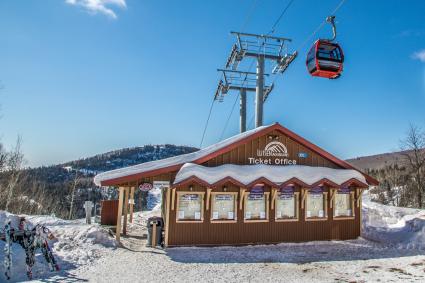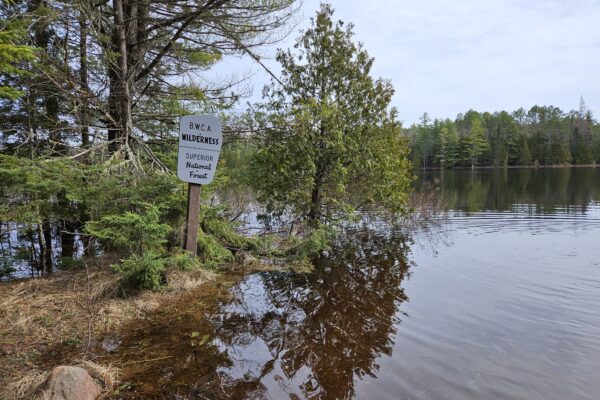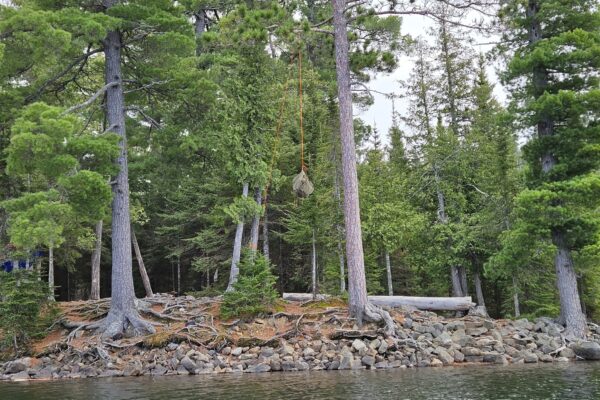Forest Service sets course to deny expansion of Lutsen Mountains
The U.S. Forest Service will not allow Lutsen Mountains to nearly double the ski resort and expand onto public land.
These are the findings of a draft decision published today by the U.S. Forest Service.
Lutsen Mountains, a ski resort on the North Shore, was seeking to nearly double the size of the local ski hill. A decision from the Forest Service denying the proposed expansion, a process that has been in the works for many years, was announced today.
Tom Hall, the Superior National Forest supervisor, told WTIP Friday morning that the proposed expansion did not align with the treaty rights across the 1854 Ceded Territory. Hall also referenced water-quality issues and various impacts to the landscape as the primary reasons to deny the request from Lutsen Mountains.
“Through tribal consultation, it was very much reinforced that this did not align with some of those tribal treaty rights that the bands were looking for as well,” Hall said. “And so, all of those factors helped to make that case in my mind of why we would deny this proposed expansion at this time.”
During the final days of July, officials from Lutsen Mountains asked the U.S. Forest Service for a “deferral of a decision on its proposal for expansion of the ski resort operation onto 500 acres of Forest Service land.” The timing of the request from Lutsen Mountains for a “deferral” aligned with a timetable proposed by the Forest Service regarding the expansion. The request for a deferral from Lutsen Mountains is essentially a moot point, according to the findings published today by the Forest Service.
“I think they understood some of the direction that we were leaning toward in the planning process and the development of the draft decision,” Hall told WTIP.
Lutsen Mountains was seeking a special use permit to “construct recreational ski trails and support infrastructure” on approximately 500 acres of federal land within the 1854 Ceded Territory on Superior National Forest. Forest Service officials maintained throughout the process that consultation and input from the Grand Portage, Fond du Lac, and Bois Forte Chippewa Bands remained paramount in terms of a decision regarding the proposed expansion. As the proposal was being considered, tribal officials spoke publicly and sent letters to local, state, and federal officials expressing their concerns about the project.
As the filing Friday is a draft decision, Lutsen Mountains has until Oct. 10 to file any objections to Hall’s decision.
In a statement sent to WTIP Friday afternoon, Charlotte Skinner, the chief of staff for Midwest Family Ski Resorts, which owns Lutsen Mountains, said the company will “listen to tribal concerns, and potential opportunities, and anticipate that it will take considerable time to gain a full understanding of tribal interests.”
“Lutsen Mountains respects the Forest Service decision process,” Skinner said. “We are committed to being an active and constructive member of our community and will work collaboratively with the sovereign tribal nations, local elected leaders, and others to improve our area.”
In May, tribal officials from three Chippewa Bands signed a memorandum of understanding (MOU) with the U.S. Forest Service to provide for co-stewardship and protection of “treaty-reserved rights under the 1854 Treaty” across the massive Superior National Forest.
The agreement, signed on May 2, is the first of its kind between the Chippewa Bands and the Forest Service.
The MOU recognizes the sovereign tribal nations as the original stewards of land now encompassing the 3.3-million-acre Superior National Forest. The document outlines procedures to ensure that input from the Bois Forte, Fond du Lac, and Grand Portage Bands is meaningfully incorporated into Forest Service decision-making.
In a statement sent from tribal officials from Bois Forte, Fond du Lac, and Grand Portage, the bands said they “with one unified voice, support the USDA Forest Service’s decision to issue a “No Action Decision” on a proposed project that would impact over 500 acres of culturally significant maple forest.” The decision by Hall and the Forest Service “is necessary to protect the bands’ off-reservation treaty rights guaranteed by the 1854 Treaty of LaPointe.” Furthermore, the decision honors the principles of co-management between the Bands and the Forest Service, upholds the federal government’s trust responsibility to the bands, and protects critical tribal treaty resources for future generations, the statement reads.
“The Grand Portage Band of Lake Superior Chippewa are very happy with the Forest Service decision,” said Grand Portage Chairman Robert Deschampe. “Impacts from the Special Use Permit would have affected our inherent rights to hunt, fish, and gather. The EIS demonstrated that the expansion would further harm maple sugar bush and old growth white cedar forest, cultural sites, and fish habitat. We as tribal leaders have a responsibility to make sure there are resources for our next seven generations.”
Grand Portage Secretary/Treasurer April McCormick said in the statement sent to WTIP that the expansion plans of Lutsen Mountains would have resulted in permanent losses to usufructuary rights and treaty reserved resources critical to the Bands’ subsistence use.
“We are proud of the Forest Service acting in its trust responsibility to our children and those yet to be born whom will rely on these significant cultural and natural resources,” she said.
WTIP’s Joe Friedrichs spoke with Hall about the draft decision published August 25. Listen to the full interview in the audio below.














